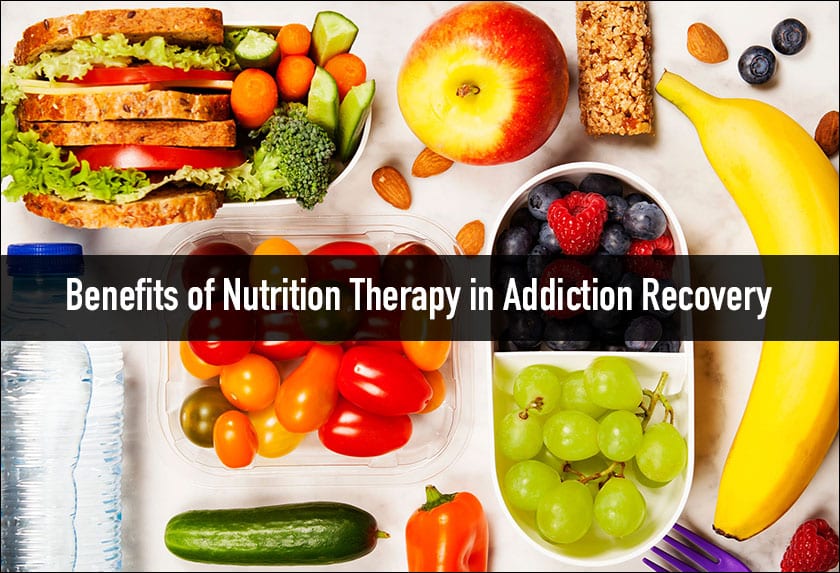When most people think of addiction recovery, group therapy and individual counseling sessions are the first things that come to mind. Most do not consider nutrition therapy to be an essential component in the mix. However, the right foods can make the world of difference between a successful recovery and relapse.
How Nutrition Therapy Is Essential in Drug and Alcohol Addiction Recovery
Check out five ways food can have a profound impact on drug and alcohol addiction recovery.
1. Reverse Malnutrition
Malnutrition is a common byproduct of substance dependency. Drugs and alcohol can strip the body of vital nutrients and using patterns may keep the individual from eating on a regular schedule. Most who are dependent on a substance skip meals frequently and when they do eat, it is not usually healthy food choices. It is not unusual to come to treatment underweight and coping with symptoms like headaches and low energy levels that could be attributed to diet as much as the substance.
When nutrition therapy is incorporated into addiction treatment, malnutrition can be reversed. It can be difficult to distinguish between the signs of withdrawal and those of malnutrition, However, when nutrition therapy is used, symptoms associated with poor diet are eliminated, making it easier to focus on recovery and manage cravings.
2. Restore Nutrients
Substance abuse prevents the body from absorbing the nutrients it requires to function at an optimal level. Each substance has a slightly different effect on the nutritional balance.
Alcohol Abuse
Alcohol abuse can lead to potentially dangerously low levels of thiamine. This vital mineral affects nearly every organ of the body and depleted levels can increase the risk of heart disease and dementia. Chronic alcohol use can also reduce the body’s ability to absorb nutrients like calcium and magnesium.
Opioid Abuse
Opioids are prescription narcotics that are highly addictive. Some people that become dependent on opiates eventually turn to heroin as a cheaper option that is easier to buy on the street. Opioid abuse can damage the intestinal lining, making it difficult for the body to absorb nutrients like B12. This vitamin plays a key role in maintaining a healthy nervous system.
Stimulants
People addicted to stimulants like cocaine often experience dangerous levels of weight loss. The effects of these drugs can also lead to dehydration and electrolyte imbalance. Stimulants like meth can also affect oral hygiene, making it more difficult to eat any type of foods.
These are not the only substances that lead to nutritional deficiencies. One study discovered that as many as 70 percent of individuals with a substance abuse disorder were deficient in vitamin D and vitamin C. Deficiencies in iron and vitamins A and E were also seen in people during the detox process.
3. Boost Good Bacteria
Addiction disrupts the delicate balance of microbiota in the gut. In addition to gastrointestinal issues raised by this imbalance, too much bad bacteria in the gut can affect the immune system, brain function and other systems of the body. It can also increase cravings, making it very difficult for a person to maintain a successful recovery path.
Nutrition therapy restores the healthy microbiota in the gut to promote greater health in the body overall. It is not something that happens overnight, but as the good bacteria start to increase once again, cravings become more manageable and other side effects like headaches and gastrointestinal upset no longer threaten to disrupt the recovery process.
4. Normalize Neurotransmitters
Neurotransmitters are chemicals in the body that are sometimes referred to as messengers. They have a substantial impact on both mood and cognitive function. For example, the neurotransmitter serotonin contributes to a happy, positive mood. It also helps to regulate sleep patterns, ensuring you get sufficient rest.
Substance abuse depletes the supply of neurotransmitters, which contributes to symptoms that often accompany addiction like depression, irritability and sleep problems. When neurotransmitter levels are low, it can lead to a stronger desire to use to mask some of these symptoms. Nutrition therapy plays a distinct role in restoring neurotransmitters to more effectively regulate mood and sleep.
5. Minimize Cravings
Chronic substance use also affects blood sugar levels in the body. When these levels fluctuate, it tends to increase cravings. While those cravings may not necessarily be for the specific substance (they could indicate hunger), users usually assume the craving is for the drug or alcohol. People with substance abuse disorders often forget what it feels like to be hungry over time, reaching for their substance of choice rather than healthy food.
The more this pattern is repeated, the worse the cravings can become. Nutrition therapy is essential for balancing the blood sugar levels in the body to dramatically reduce cravings. At the same time, stable blood sugar levels can eliminate other uncomfortable symptoms that might lead someone to consume more of the substance in an effort to minimize those feelings.
Nutrition Therapy: A Key to Recovery
Nutrition therapy should be incorporated into any addiction treatment program whether it is inpatient or outpatient. Introduction of healthy foods daily, instruction on preparing nutritious foods and limits on the consumption of sugar and caffeine can all contribute to a more successful recovery process.













